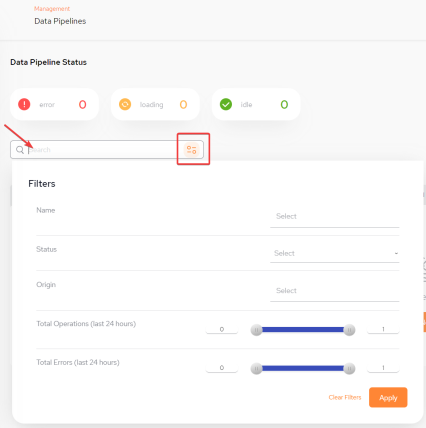SpaceDeck – Data Pipelines Overview
Data Pipelines are flexible, configurable, no-code components that gather data from a mix of System of Record databases and tables. This data is loaded into the extremely high speed GigaSpaces data grid, where it can be accessed on a read/write basis.
Data Pipelines - Main Screen
The Data Pipeline![]() A series of data processing steps, including extraction, transformation, and loading (ETL), that move data from its source to a destination system. Data pipelines are essential for integrating and managing data flows. main screen shows the status of the existing data pipelines. You can see details of a pipeline by clicking on its name in the list.
A series of data processing steps, including extraction, transformation, and loading (ETL), that move data from its source to a destination system. Data pipelines are essential for integrating and managing data flows. main screen shows the status of the existing data pipelines. You can see details of a pipeline by clicking on its name in the list.
Data Pipelines - Main Screen - Fields
Data Pipeline Status:
-
Error – pipeline is not available because of one of the following conditions: not found/connection error/not started/started but not running/loading stopped/suspended
-
Loading – pipeline is in the process of being configured
-
Idle – pipeline is configured and the data integration is available
Field Names:
-
Export - Click this to export selected rows in the table.
-
Group by Status – toggle to show the pipelines grouped status
-
Create New + – click this to configure a new pipeline. See SpaceDeck – Data Pipeline – Create New Pipeline for instructions on how to define a new pipeline.
-
NAME – name assigned to the pipeline
The Pipeline name has no naming limitations
-
STATUS – one of the following conditions: started/stopped/not starting/restarting/not found
-
TYPE – the connection type for the pipeline, for example, IIDR
 IBM Infosphere Data Replication.
This is a solution to efficiently capture and replicate data, and changes made to the data in real-time from various data sources, including mainframes, and streams them to target systems. For example, used to move data from databases to the In-Memory Data Grid. It is used for Continuous Data Capture (CDC) to keep data synchronized across environments.
IBM Infosphere Data Replication.
This is a solution to efficiently capture and replicate data, and changes made to the data in real-time from various data sources, including mainframes, and streams them to target systems. For example, used to move data from databases to the In-Memory Data Grid. It is used for Continuous Data Capture (CDC) to keep data synchronized across environments. -
ORIGIN – data source type from the System of Record, e.g. Oracle
-
TOTAL OPERATIONS (LAST 24 HOURS) – number of operations performed by the pipeline in the last 24 hours
-
TOTAL ERRORS (LAST 24 HOURS) – number of error operations performed by the pipeline in the last 24 hours

For more information:
 In-Memory Data Grid - achieve unparalleled speed, persistence, and accuracy.
In-Memory Data Grid - achieve unparalleled speed, persistence, and accuracy.